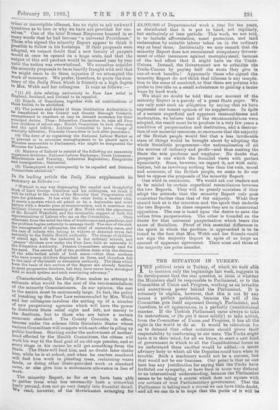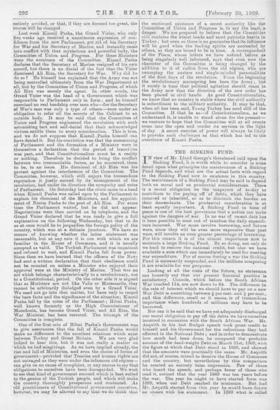THE SITUATION IN TURKEY.
T'political crisis in Turkey, of whichWe were able to mention only the beginnings last week, suggests in its development that the real question at issue is whether the Ministers shall be responsible to Parliament, or to the Committee of Union and Progress, working as an invisible and anonymoue poWer behind the Parliament. It is nebessary to explain, however, that this is not by ally means a perfectantithesis, because the will of the Committee gets itself expressed through Parliament, and therefore, to all appearances, in a perfectly Constitutional manner. If the Tarkish Parliament cares always to take its instructions,' or (to fiat it more mildly) to take aaidei, from the Committee of Union and Progress, it has all the right in the World to do so. It would be ridiculous for us to demand that other countries should prove their respectability by conforming to our tests. The Turke might have it in their mind, for all we know, to erect a new kind of government in which to all the Constitutional forms as We understatid them another would be added,—a Secret advisory body to which all the Deputies could turn when ill trouble. Such a Machinery would not be a success, but that would not be our business. Our point is that ne one here has any justification for saying that the Turks have forfeited our sympathy, or have been in some way disloyal to an international understanding, because the Parliament seems to be taking a course which does not square the our notions of tree Parliamentary government. That Parliament is taking such a course we cat have little doubt, and all we can do to hope that the p5rits of it Will be . entirely avoided, or that, if they are deemed too great, the bourse will be changed.
Last week Kiamil Pasha, the Grand. Vizier, who only fivo, weeks ago received a unanimous expression of con- fidence from the new Parliament, got rid of his Secretary for War and his Secretary of Marine, and instantly.came into conflict with that mysterious and powerful body, the ,Committee og, Union and Progress. For these Ministers were the nominees of the Committee. Kiamil Pasha declares that the Secretary of Marine resigned of his own accord, but there is no denial of the fact that the Vizier dismissed Ali Riza„ the Secretary for War. Why did lie do so ? He himself has explained that the Army was not being controlled ultimately from the War Department at all, but by the Committee of Union and Progress, of which Ali Riza was merely the agent. In other words, the Grand Vizier was the head of a Government which was responsible to Parliament only in form ; and he himself exercised no real headship over men who—for the Secretary of War's ease was only a type of others—were under an obligation to .refer all the secrets of the Cabinet to an outside body. It may be said that the Committee of Union and Progress engineered the revolution with such astonishing tact and self-denial that their acknowledged virtues entitle them to every consideration. This is true, and we do not suppose that Kiamil .Pasha himself can have denied it. But his conviction was that the summoning of Parliament and the formation of a Ministry were in themselves, a declaration that the period of tramitiou was past, and that Constitutionalism must be a reality or nothing. Therefore be decided to bring the conflict between two irreconcilable forces, as he conceived, them to be, to an issue. His dismissal of Ali Riza was his protest against the interference of the Committee. The Committee, however, which still enjoys the tremendous reptitatien it justly earned by its 'management of the revolution, had under its direction the sympathy and votes of Parliament. On Saturday last the crisis came to a head When 'Kiatuil Pasha was called upon by the Parliament to explain his dismissal of the Ministers, and his appoint- ment of Nazim Pasha to the post of Ali Riza, For some time the Parliament waited, but he did not appear. Negotiations were then carried on by telephone, and the Grand Vizier declared that lie was ready to give a full explanation on the following Wednesday, but that to do so at once would be to jeopardise the foreign policy of the country, which was at a delicate juncture. We have no means of knowing whether the latter statement was reasonable, but at any rate it is one with which we are familiar in the House of Commons, and it is usually accepted as valid. The Turkish Parliament was impatient and refused to wait, and Kiamil Pasha fell from power. Since then we have learned that the officers of the Navy had sent a written declaration that their obedience could not be counted on unless a Minister who enjoyed their approval were at the Ministry of Marine. That was an act which belongs characteristically to a revolutionary, not to a Constitutional, period. On the other side it is argued that as Ministers are not like Valis or Mutessarifs, they cannot be arbitrarily dislodged even by a Grand Vizier. We need not go into that matter, but have only to record the bare facts and the significance of the situation; Kiamil Pasha fell by the votes of the Parliament ; Hilmi Pasha, well known formerly as the High Commissioner , of Macedonia, has become Grand Vizier, and Ali Riza, the War Minister, has been restored. The triumph of the Committee is complete.
One of the first acts of Hilmi Pasha's Government was to give assurances that the fall of Kiamil Pasha would make no difference to the excellent relations which exist between Turkey and Great Britain. We are very glad indeed to hear this, but it was not really a matter on which we had misgivings. As we have implied already, the rise and fall of Ministries, and even the choice of forms of government—provided that Treaties and human rights are not outraged as they were under the infamous old regime— can give us no cause of complaint, or any excuse to say that obligations to ourselves have been disregarded. We wish to see that kind of government succeed which is best suited io the, genius of the Turkish people, and which will make the country thoroughly prosperous and contented. As • old practitioners of Constitutional government ourselves, however, we may be allowed to say that we do think that the continued existence of a secret authority like the Committee of Union and Progress is, to say the least, a danger. We are prepared to believe that the Committee still contains the wisest heads and most. patriotic hearts in Turkey ; but even so there is no guarantee that its influence will be .good when the leading spirits are succeeded. by others, as they are bOund to be in time. A correspondent of the Times, whose letters we have noticed before as being singularly well informed, says that even now the character of the Committee is being changed by the addition to it of rapids from the old regime, who are swamping the austere and single-minded personalities of the first days of the revolution. From the beginning the revolutionary mainspring has been the Army ; but it surely is time that political agitation should. cease in the Army now 'that the direction of the new order has been pladed in civil' • hands. As good Constitutionalists, we know that no country is stable where the civil authority is subordinate to the military authority. It May be that, when all has been said, Young Turkey has need still of the Committee. If that be so—if Constitutionalism, as we understand it, is unable to stand alone for the present we venture to hope that the Committee will at all events come into the open and render its services in the light of day. A secret exercise of power will always be likely to provoke such challenges as that which has led to the overthrow of Kiamil Pasha.











































 Previous page
Previous page